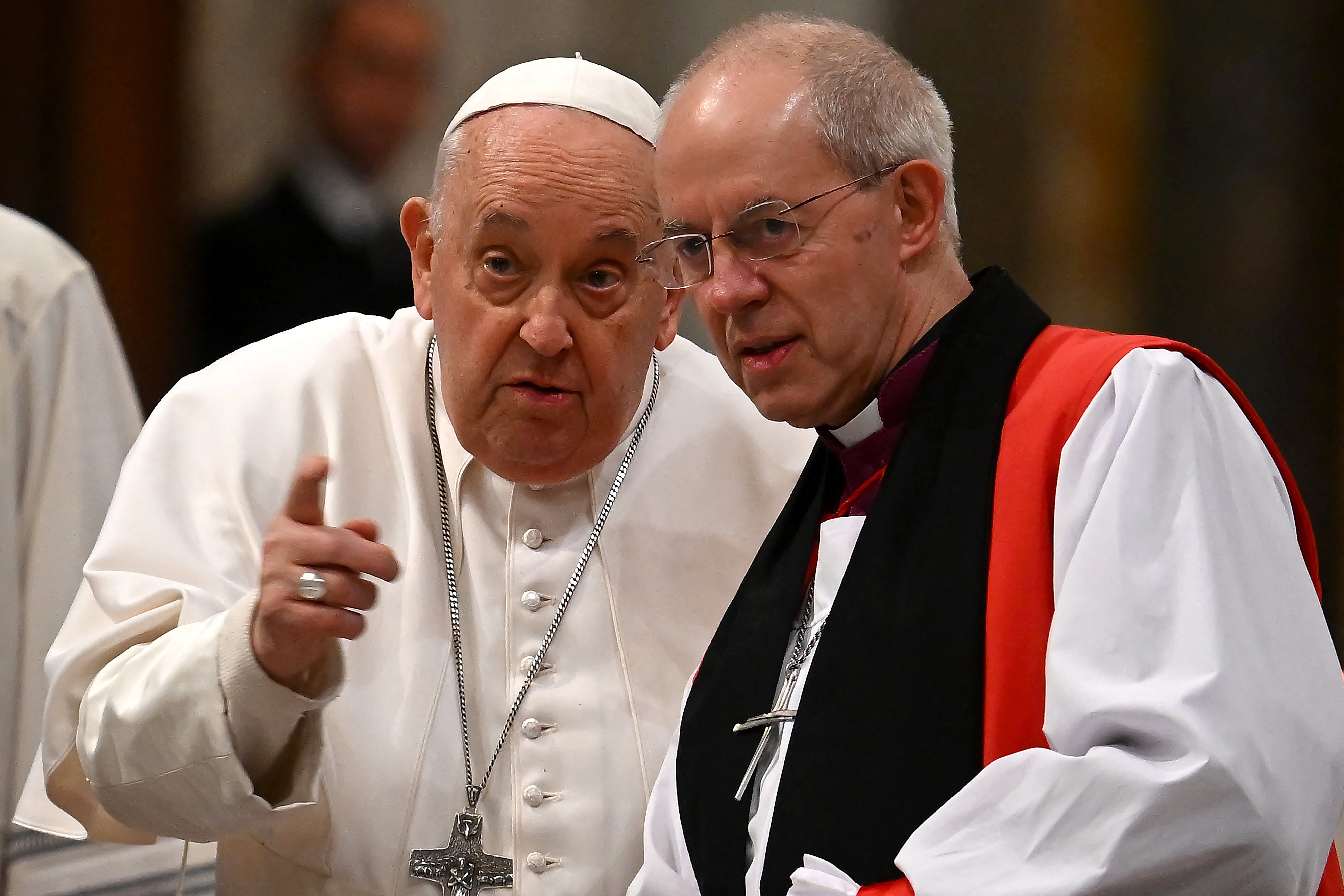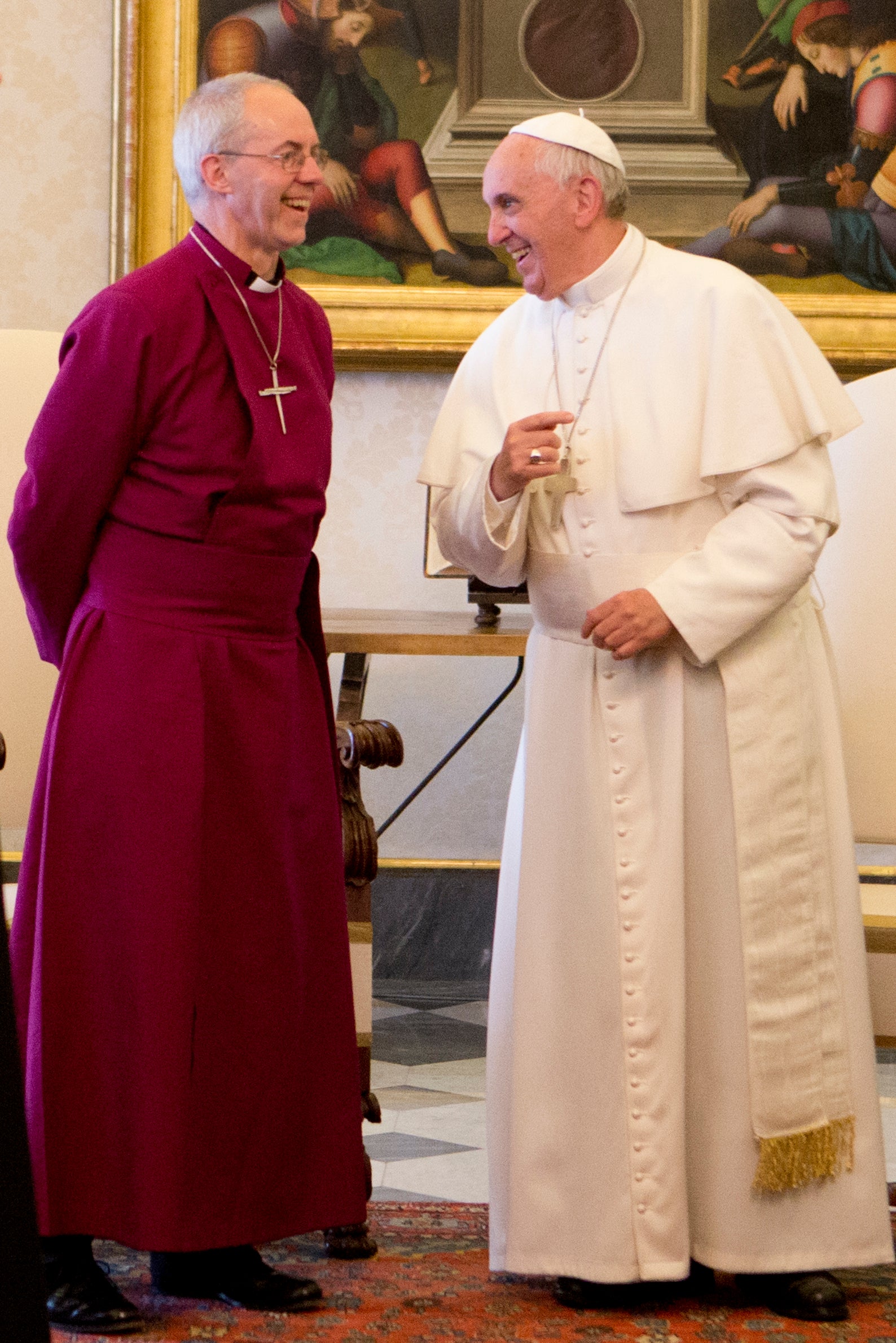I will never forget the first time I met the Pope in 2013.
I had never met a Pope before and was on edge. The Vatican is designed to overwhelm visitors with power. We walk through long corridors to his office, a man in an exquisitely tailored tailcoat leading us; Swiss Guards in their full uniforms salute as we pass.
The wall paintings are beyond description; you could do a Renaissance art course just in the rooms we go through. I am taken into the meeting, with my colleagues, cameras clicking, TV present. It is surreal. The others are ushered out and we sit either side of a desk.
“I am senior to you,” he says, with a level look. I feel a sense of disappointment: I did not think he was like that. “Indeed you are, Your Holiness...” I begin.
He interrupts, smiling, “by three days”. He was inaugurated that much before me: in March, earlier that year.
We both laugh and there are the beginnings of a friendship.
The second standout time I remember with the Pope is around 2016 – in a small room in the modern block of flats in Rome where the Pope has lived since his election.
I am with him and an interpreter. We speak of prayer, of God’s love in Christ, of the work of God’s Spirit in a world of war, of human weakness including ours. I listen to his wisdom on how to lead a global church.

At the end of the meeting, I nervously ask if he would do a recorded message for an event in Trafalgar Square a couple of months later. He grins. “Have you got your phone?” I answer yes. “Let’s record it now, before anyone tries to stop me!” He delivers a fluent and off the cuff message about the work of the Holy Spirit of God, profound in theology, accessible and powerful.
The third fond memory is of a roasting hot evening in 2023. I am at a vast stadium and gathering place in Juba, South Sudan; the crowd stretches to the horizon, some have walked nine days to be there.
On the stage are three chairs. In the centre, the white clad figure of the Pope. To his right sits the moderator of the Church of Scotland. I am on the left. It is the Pilgrimage of Peace: we each address the crowd, and each speak directly to different people. The president and cabinet are sitting in the front row.
No punches are pulled. The Pope challenges corruption, violence, power seeking. He turns to the women in the crowd and tells them of God’s love for them in their agony of war, rape and hunger. He speaks of the need for a government that loves. Inspired by his example, the moderator and I are equally direct.
As the crowd responds with singing, with cries and tears, a flight of cranes flies over our heads towards the setting sun. It is the universal pastor of Christians speaking God’s call to a government that seems unwilling to listen, in the hearing of the people for whom they are meant to care.
How many times did we meet? I am not sure, but many. We last spoke when he rang after the announcement of my resignation last November.

There was little warning, just a call and his voice.
This was typical of the man who was, above all, a pastor. Every day, he used to ring a designated telephone number to talk to the congregation of a bombed out monastery in northern Gaza. It was always his instinct to connect and to comfort.
The last time I saw him in person was in St Peter’s Square, the great basilica behind us as he convened a meeting of Christian leaders – from Orthodox to Pentecostal and all between. He was, as usual, humble and kind, as a few of us spoke. We knelt in silent and united prayer before an ikon of the Jesus’ crucifixion, the crowd behind us also silent as the sun shone down from a cloudless sky.
It always seemed to be sunny when we met. It was probably the most varied and largest gathering of church leaders since the reformation. He convened it not by force, but by love and it was in mutual love that for a moment such a large part of the more than 2bn Christians were represented together before Jesus Christ in seeking God. As we all left, he shook my hands with both of his.
Francis was someone who made people want to know God – and God’s love – as he did. He was not perfect, but he was passionate for God. He was supremely relational – regardless of status – and he lived out his call for the shepherd to be close to the sheep. He saw those who sought, however poorly and fallibly, to follow Christ as brothers and sisters. Whether they were in prisons or palaces, slums or stadiums, made no difference.
He lived simply, like St Francis, from whom he took his name. He lived out Mary’s song, the Magnificat, in Luke’s gospel – that revolutionary hymn to the reversal of power. As Mary the mother of Jesus sang, so Francis obeyed – calling on the powerful to serve, the rich to be sacrificially generous, the rulers to be at the feet of the ruled.
He was a supreme master of symbolic actions that preached a sermon instantly.
In 2019, at his request, the leaders of government and rebels in South Sudan gathered for a 36 hour retreat at the Vatican. Once again, the then moderator of the Church of Scotland and I worked with the Curia and co-led the event. At the end, he spoke on the witness and call of Christ – superbly, profoundly.
Then he stood, walked round to the South Sudanese leaders – the towering Dinka and Nuer included – and knelt to kiss their shoes, saying, “I beg you, make peace”. It is on YouTube.
Their choice as to what to do – and they have yet to act as they should – was squarely before them. The symbol spoke in tones of absolute authority; through it the voice of God was saying, “act rightly like my servant Francis”.
So, what now? God’s universal, fractured and suffering church is so much greater than any Pope (let alone Archbishop). As I found even in the small corner that is Anglicanism around the world, centuries of history and a global presence bring a complexity – which means that even Roman Catholicism is an organism, a living ecology, not an organisation.
It can be frustrating – I saw and heard his frustration. To the outside observer, little may seem to change. It will be decades before we see whether the things Francis did bear fruit. The next Pope may well be from Asia or Africa, with a deep conservatism on issues we consider in the UK to be so obvious they need no discussion.
But they will also find that bending the attitudes of 1.2bn Catholics to a single agenda is unthinkable. They come from every country on earth and speak every tongue under heaven. The Pope is not the CEO of Rome Inc., but the Holy Father. His call is to love God and love people – and through his universal primacy, to enable Catholics first (and all others also) to love God in Christ and to love people.
That is his legacy: to be a Pope of love, serving the God of love, who emptied himself, taking the form of a servant, like Jesus Christ. That love was returned – and it is that love that God’s church is called to sow, nurture and see from it a harves, in God’s time.
What will really decide who becomes the new Pope
Pope Francis was the people’s pontiff. His successor must be too
Pope Francis: the revolutionary who changed the Catholic Church and the world
It’s official – Donald Trump is bad for the world economy
Is Labour’s breakfast club rollout a poorly disguised bribe?
Could Trump, the ‘puerile president’, now sink the global economy?







